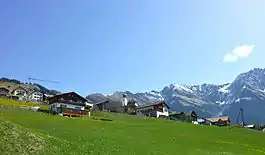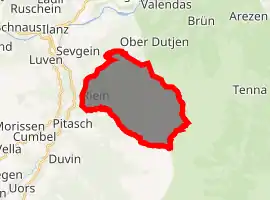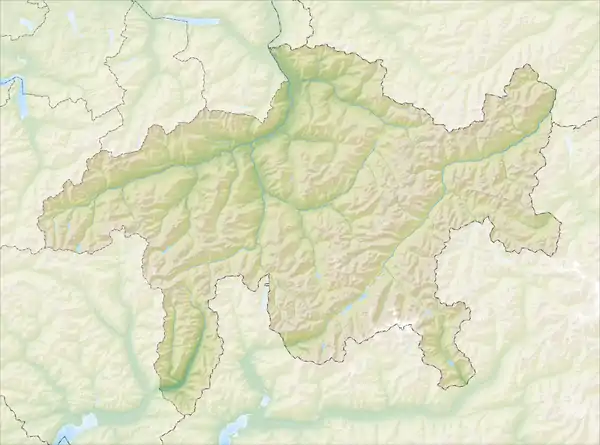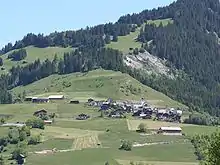Riein
Riein is a village and a former municipality in the district of Surselva in the canton of Graubünden in Switzerland. On 1 January 2014 the former municipalities of Riein, Castrisch, Ilanz, Ladir, Luven, Pitasch, Ruschein, Schnaus, Sevgein, Duvin, Pigniu, Rueun and Siat merged into the new municipality of Ilanz/Glion.[1]
Riein | |
|---|---|
 | |
 Coat of arms | |
Location of Riein 
| |
 Riein  Riein | |
| Coordinates: 46°44′N 9°13′E | |
| Country | Switzerland |
| Canton | Graubünden |
| District | Surselva |
| Area | |
| • Total | 15.88 km2 (6.13 sq mi) |
| Elevation | 1,270 m (4,170 ft) |
| Population (Dec 2011) | |
| • Total | 67 |
| • Density | 4.2/km2 (11/sq mi) |
| Time zone | UTC+01:00 (Central European Time) |
| • Summer (DST) | UTC+02:00 (Central European Summer Time) |
| Postal code(s) | 7128 |
| SFOS number | 3579 |
| Surrounded by | Castrisch, Duvin, Pitasch, Safien, Sevgein, Tenna, Valendas |
| Website | SFSO statistics |
History
Riein is first mentioned in 765 as Renino. In 960 it was mentioned as Raine.[2]
Geography

Before the merger, Riein had a total area of 15.8 km2 (6.1 sq mi).[3] Of this area, 21.9% is used for agricultural purposes, while 37.2% is forested. Of the rest of the land, 0.9% is settled (buildings or roads) and the remainder (39.9%) is non-productive (rivers, glaciers or mountains).[3]
The former municipality is located in the Ilanz sub-district of the Surselva district. It is located at the entrance to the Lumnezia on a terrace east of the Glenner. It consists of the haufendorf village (an irregular, unplanned and quite closely packed village, built around a central square) of Riein and the hamlet of Signina, which joined Riein in 1904-05. Signina is separated from Reien by the Val da Riein.
Demographics
Riein had a population (as of 2011) of 67.[3] As of 2008, 1.6% of the population was made up of foreign nationals.[4] Over the last 10 years the population has decreased at a rate of -22.2%. Most of the population (as of 2000) speaks Romansh(63.4%), with German being second most common (35.2%) and Italian being third ( 1.4%).[3]
As of 2000, the gender distribution of the population was 45.7% male and 54.3% female.[5] The age distribution, as of 2000, in Riein is; 6 children or 8.5% of the population are between 0 and 9 years old and 7 teenagers or 9.9% are between 10 and 19. Of the adult population, 5 people or 7.0% of the population are between 20 and 29 years old. 9 people or 12.7% are between 30 and 39, 9 people or 12.7% are between 40 and 49, and 13 people or 18.3% are between 50 and 59. The senior population distribution is 8 people or 11.3% of the population are between 60 and 69 years old, 11 people or 15.5% are between 70 and 79, there are 2 people or 2.8% who are between 80 and 89 there is 1 person who is between 90 and 99.[4]
In the 2007 federal election the most popular party was the SVP which received 68.9% of the vote. The next three most popular parties were the FDP (23%), the CVP (4.4%) and the SP (3.7%).[3]
In Riein about 50% of the population (between age 25-64) have completed either non-mandatory upper secondary education or additional higher education (either university or a Fachhochschule).[3]
Riein has an unemployment rate of 0.54%. As of 2005, there were 15 people employed in the primary economic sector and about 6 businesses involved in this sector. people are employed in the secondary sector and there are businesses in this sector. 3 people are employed in the tertiary sector, with 1 business in this sector.[3]
The historical population is given in the following table:[2][5]
| year | population |
|---|---|
| 1850 | 218 |
| 1930 | 118 |
| 1950 | 126 |
| 1960 | 104 |
| 1970 | 91 |
| 1980 | 92 |
| 1990 | 89 |
| 2000 | 71 |
References
- Nomenklaturen – Amtliches Gemeindeverzeichnis der Schweiz Archived 2015-11-13 at the Wayback Machine (in German) accessed 13 December 2014
- Riein in German, French and Italian in the online Historical Dictionary of Switzerland.
- Swiss Federal Statistical Office accessed 23 January 2014
- Graubunden Population Statistics Archived August 27, 2009, at the Wayback Machine (in German) accessed 21 September 2009
- Graubunden in Numbers Archived September 24, 2009, at the Wayback Machine (in German) accessed 21 September 2009
| Wikimedia Commons has media related to Riein. |
External links
- Riein in German, French and Italian in the online Historical Dictionary of Switzerland.